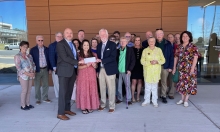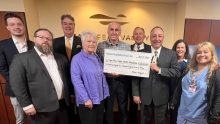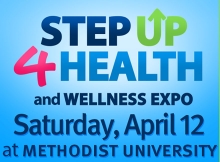Heart & Vascular
At 36 years of age, with a 2-month-old baby, the last thing Michelle Boyd expected was a heart attack. When she began to experience chest pains, she explained them away as nothing serious.
“I convinced myself it was heartburn,” she said.
With her maternity leave coming to an end, Boyd was determined to get some things done around the house before returning to her job in real estate. She sent her eldest child off to his first day of kindergarten, and the middle child off to daycare with his new baby sister.
“I was rearranging some furniture,” she said, “and the chest pains came back. And this time, the pain was down my arm and up to my jaw.”
She called her mother, who lives nearby. Her mother, recognizing the signs of a possible heart attack, called 911. Soon an ambulance was pulling up to Boyd’s home in Gray’s Creek.
“Everything went really quickly after that,” she said. “I remember a man asking me about my stress level, and the next thing I knew I was waking up in the hospital.”
She awoke to learn that she’d suffered a serious heart attack. Her heart had stopped more than once, but she was stable after the placement of a stent to prop open the blocked artery that had nearly killed her.
While it may be surprising to hear of a woman in her 30s having a heart attack, recent studies have shown that heart attack hospitalizations in the 35 to 54 age group are rising. The increase is especially pronounced among women in that age group.
Most of these involved at least one of three major risk factors: high blood pressure, high cholesterol and smoking. Additional risk factors include diabetes, unhealthy diet, lack of exercise and a family history of heart disease.
Boyd says her heart attack was the result of a “perfect storm” of risk factors. In addition to a strong family history of heart attacks, her blood pressure had been elevated since giving birth two months earlier. A recent bout with COVID-19 had left her with lingering vascular issues. As a busy working mom, she had some unhealthy habits and often put her own needs on the back burner.
Her hospital stay gave her plenty of time to ponder all of this. Although much of the experience is still a blur, she does recall the kindness of the staff who cared for her.
“I felt really pampered at the hospital,” she said. “I was still testing positive for COVID, so I couldn’t have visitors at first. The nurses let me borrow their own phones so I could FaceTime my family.”
After six days in the hospital, Boyd was strong enough to go home to her husband and kids. But she still had to take it easy.
“I was sent home on oxygen,” she said, “and I still felt very weak. Even going to the bathroom was very taxing. My husband was really a superman. He took care of everything. And I felt a little stronger every day.”
A year later, Boyd is feeling much more like herself again. And she’s taking better care of her heart: She’s quit smoking, works out regularly, and has improved her eating habits.
She also keeps up with regular doctor visits, something she hadn’t done before.
“Before all this, I never really went to the doctor,” she said. “I saw my OB/GYN while I was pregnant, but that was about it.”
Now she has a general practitioner to keep an eye on her overall health, and continues to see Manoj Bhandari, M.D., FACC, FASE, the cardiologist she credits with saving her life.
“He’s amazing,” Boyd said. “Whenever I have a question, he’s right there with the answer.”
When she recently had an allergic reaction to one of her medications, it was Dr. Bhandari who encouraged her to get checked out in the emergency department. There she encountered a nurse who remembered her from her ordeal a year earlier.
“I just thought it was amazing that she would remember me after all that time,” Boyd said. “She said it was good to see me doing so well.”
Looking back on things a year later, Boyd says she has learned an important lesson.
“It was confirmation that I need to listen to my body,” she said. “I think deep down, I knew that wasn’t just heartburn.”




